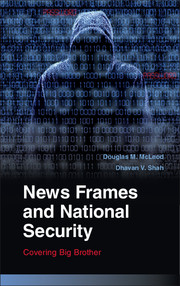Book contents
- Frontmatter
- Contents
- Preface and Acknowledgments
- Introduction
- Part I Conceptual Framework
- Part II Framing Effects Research
- 3 Designing the Studies
- 4 Converging Cues and the Spread of Activation
- 5 Cognitive Complexity and Attitude Structure
- 6 Security Concerns and Tolerance Judgments
- 7 Group Perceptions and Expressive Action
- Part III Implications and Conclusions
- Bibliography
- Index
7 - Group Perceptions and Expressive Action
Published online by Cambridge University Press: 18 December 2014
- Frontmatter
- Contents
- Preface and Acknowledgments
- Introduction
- Part I Conceptual Framework
- Part II Framing Effects Research
- 3 Designing the Studies
- 4 Converging Cues and the Spread of Activation
- 5 Cognitive Complexity and Attitude Structure
- 6 Security Concerns and Tolerance Judgments
- 7 Group Perceptions and Expressive Action
- Part III Implications and Conclusions
- Bibliography
- Index
Summary
“Since when did feeding the homeless become a terrorist activity? When the FBI and local law enforcement target groups like Food Not Bombs under the guise of fighting terrorism, many Americans who oppose government policies will be discouraged from speaking out and exercising their rights.”
– Ann Beeson ACLU Associate Legal Director“To treat a reporter as a criminal for doing his job – seeking out information the government doesn’t want made public – deprives Americans of the First Amendment freedom on which all other constitutional rights are based. Guns? Privacy? Due process? Equal protection? If you can’t speak out, you can’t defend those rights, either.”
– Dana Milbank The Washington Post May 21, 2013Shortly after the September 11 attacks, television commentator and comedian Bill Maher found his program losing sponsors. Advertisers Sears and FedEx were among those that pulled advertising from Maher’s “Politically Incorrect” program after his comments regarding the attacks proved too “incorrect.” Maher proposed that while the 9/11 terrorists could be called many things, “cowardly” was not among them. He went on to suggest that the American military, lobbing cruise missiles from afar, was the cowardly group (Bohlen, 2001). Maher was not the only one to make such a suggestion. In fact, his comments echoed those of a conservative commentator from the American Enterprise Institute (AEI), Dinesh D’Souza, a guest on Maher’s show that evening. Susan Sontag also argued that whatever the terrorists might have been, they were not cowards. While Sontag was skewered in columns and letters, there was no evidence of a drop in support for the AEI (Bohlen, 2001). Maher was one of the first individuals to experience the chilling effect of the post-9/11 climate on public expression, but he was certainly not the last.
Even in recent years, it was revealed that the government had also engaged in efforts to muzzle whistleblowers and silence reporters, prosecuting them as criminal codefendants. Journalist Glenn Greenwald (2012) asserted, referring to the case of William Binney, an NSA leaker who preceded Snowden, that the “war on whistleblowing [was] designed to shield from the American public any knowledge of just how invasive this Surveillance State has become.” Many observers, both inside and outside of government, noted that this was just one of many instances of how the government “uses technology to silence critics” (Milbank, 2013).
- Type
- Chapter
- Information
- News Frames and National SecurityCovering Big Brother, pp. 143 - 156Publisher: Cambridge University PressPrint publication year: 2014

